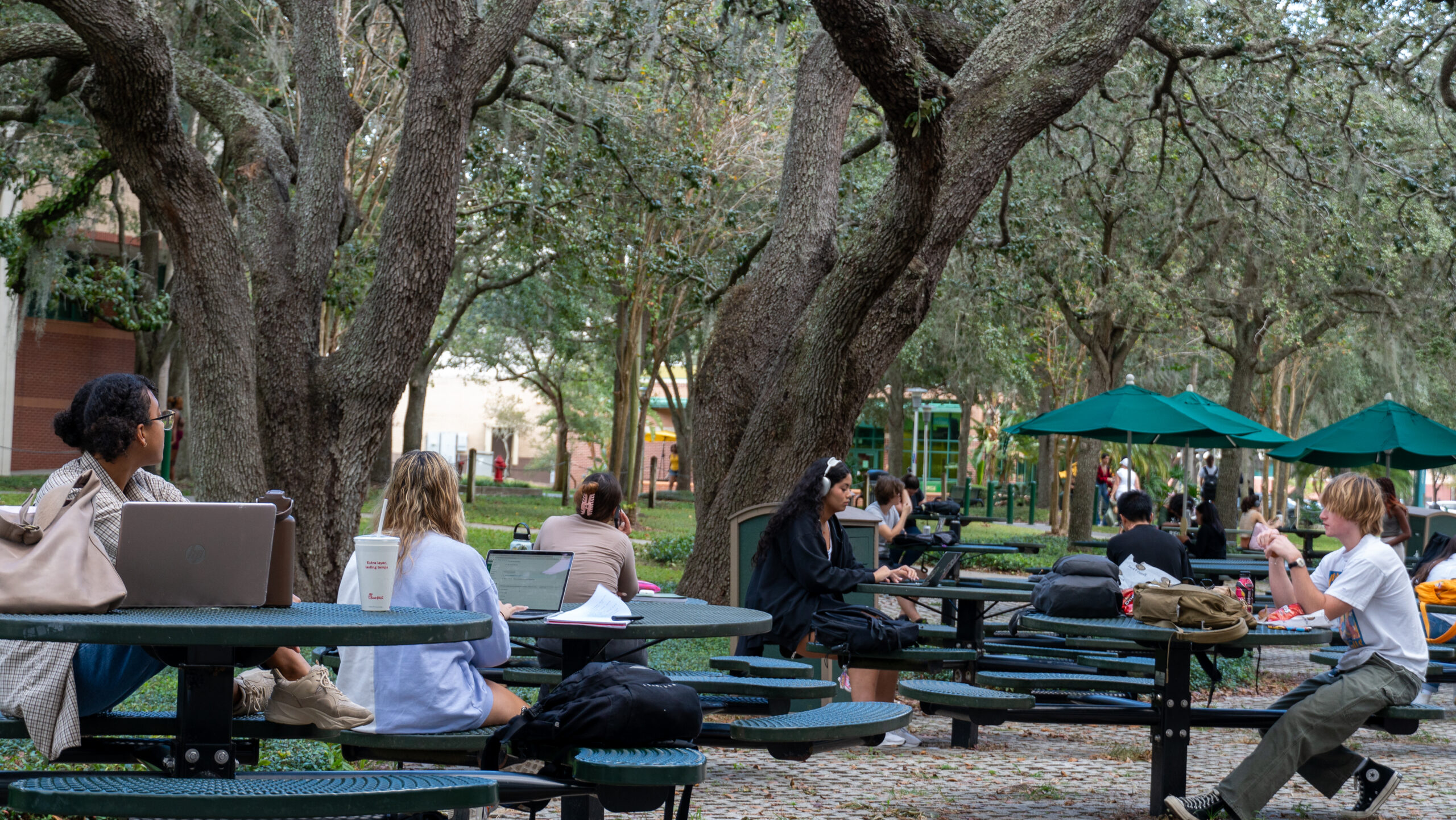‘USF is afraid to support us’: Black enrollment decrease fuels demand for representation

Though USF advertises itself as a diverse college, junior humanities and cultural studies major Gabrielle Whyte said Black student enrollment seems to be a convenient topic for it to leave out when discussing diversity.
Whyte said she noticed an apparent lack of Black students in classrooms. She said that each of her classes has a maximum of three Black people, which affects the perspectives students from her major can explore.
“Having diverse perspectives represented in my major is very important because we learn about people, cultures and politics. I would not blame Black students in my field of study if they didn’t feel represented because we definitely aren’t,” Whyte said.
Related: ‘Increase Black enrollment now’: Protestors interrupt Law’s inauguration
Black enrollment has been on a slow decline at USF, according to USF Fact Books. The number of Black students enrolled at USF over the past few years are:
- 4,599 (10.0% of total student population) for the 2019-20 school year
- 4,452 (9.6% of total student population) for the 2020-21 school year
- 4,276 (9.5% of total student population) for the 2021-22 school year
- 3,995 (9.1% of total student population) for the 2022-23 school year
USF’s Strategic Enrollment Planning Council is working with higher education consulting firm Ruffalo Noel Levitz (RNL) to complete the Strategic Enrollment Plan, according to Director of Media Relations Althea Johnson.
The plan will include recommendations for enhancing the university’s current enrollment management practices and infrastructure to “remove barriers to students, faculty and staff,” said Johnson. It will be delivered to university leadership in December 2023.
Project plans that gain approval will be implemented starting 2024, Johnson said.
One of USF’s goals is to focus more on outreach and access pathways. Admissions Leader Malcolm Randolph was promoted to Director of Special Populations so that he could invest more time in expanding outreach efforts, according to Johnson.
Related: USF developing plan to increase Black enrollment
To hear that the Black student enrollment has decreased is unfortunate because there is already a small number of Black students in the higher-level classes for her major, said senior accounting major Feyi Ogbeibu.
Senior English major Abrionna McMillan said she notices the lack of Black representation on campus, making her worry about diversity and inclusion in USF’s classes.
“I’ve noticed that even in the African American Literature classes, there are very few Black people in attendance. I’m probably one of two in each class,” McMillan said.
Whyte said she feels like increasing the enrollment of Black students would help because there is “tone-deafness” in classes. She said she doesn’t always feel comfortable asking questions or sharing her opinions because she is usually one of the only Black people in the classroom.
“If you feel uncomfortable because you’re the only Black student in the room, you won’t want to stay. You will leave, but somebody else who comes after you will have the same problem, which will start a loop process,” Whyte said.
One issue related to professors that Whyte identified was the Western European way of teaching. She said that USF should prioritize lectures with alternate perspectives because feeling excluded from your course of study is unacceptable.
“Even if there are other Black people in the classroom, if you’re being taught from a perspective that excludes you and your experience, that will make Black students not want to study at USF,” Whyte said.
Whyte said she hasn’t had a Black professor in any of the classes from her major. Having more Black faculty at USF would make Black students more comfortable in classrooms, especially when taking certain types of classes with touchy topics, according to Whyte.
“White faculty members do try their best, but I think representation creates a sense of safety and familiarity for students who already feel like what they’re talking about is dangerous waters for them,” Whyte said.
The Diversity, Anti-Racism & Equity (DARE) Dashboard for fall 2022 states that the number of USF faculty during that period was:
- White: 1,791 (65% of total faculty population)
- Black: 156 (6% of total faculty population)
When the Black community is represented at USF, McMillan said she feels it’s done poorly.
“I remember one of the dining halls once had a ‘Black culture’ themed meal, which was just poorly made soul food. It was kind of embarrassing, and many people walked out,” McMillan said.
The Black community could also benefit from events outside of Black History Month, according to Whyte.
“Having events primarily during Black History Month makes it seem like USF only pays attention to the Black community once a year for activism purposes,” Whyte said.
Whyte said that affordability is also a big issue at USF. She said that it is already expensive enough to go to college, and then it’s also costly to stay on campus.
“USF offers scholarships to assist Black students financially, but that is where the support stops. It is very covert, almost as if USF is afraid to support us,” Whyte said.
Related: Is USF affordable? Students say they can barely pay for food, housing
McMillan said USF should adjust its outreach methods and its target audience. Representatives should look at the demographics of specific neighborhoods to bring more Black students in.
Ogbeibu said it’s essential for USF to focus on increasing Black student enrollment as a matter of respect and to help stop microaggressions.
“The decrease in Black student enrollment is unfortunate because it gives people of other groups an advantage, and it makes them feel like they can say or behave differently toward us because we become the minority,” Ogbeibu said.







